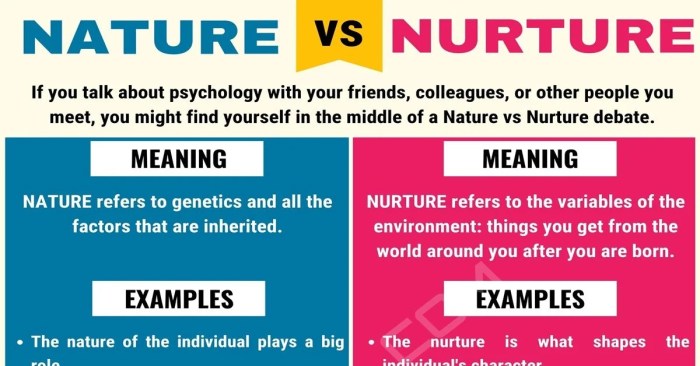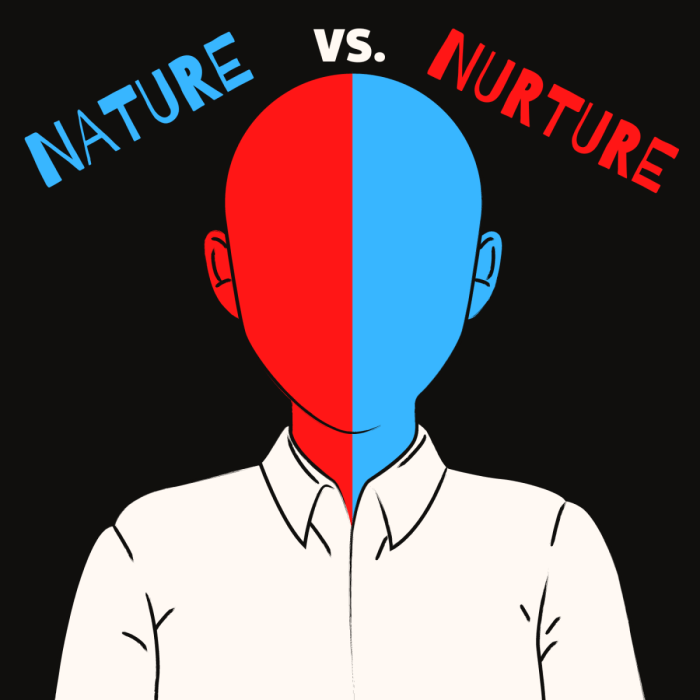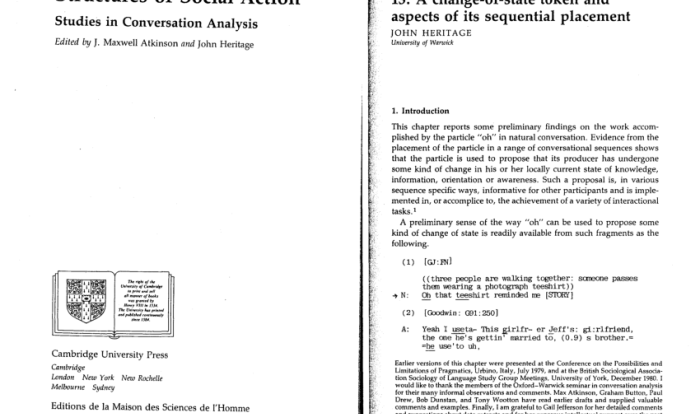Lord of the flies nature vs nurture – William Golding’s “Lord of the Flies” is a gripping tale that explores the complex interplay between nature and nurture, posing profound questions about the inherent savagery of human nature and the fragility of civilization.
The novel follows a group of British boys stranded on a deserted island after their plane crashes. As they attempt to establish a new society, the boys’ true natures are gradually revealed, leading to a descent into chaos and violence.
Nature vs. Nurture in “Lord of the Flies”

The novel “Lord of the Flies” by William Golding explores the inherent savagery of human nature and the role of civilization in shaping human behavior. When a group of British boys are stranded on a deserted island, they are initially excited by their newfound freedom.
However, as time goes on, the boys’ true natures begin to emerge, and they descend into chaos and violence.
Inherent Savagery of Human Nature
Golding depicts the inherent savagery of human nature through the character of Jack. Jack is a charismatic and aggressive boy who quickly becomes the leader of the boys. He is obsessed with hunting and violence, and he sees the island as a place where he can finally give free rein to his primitive instincts.
Jack’s behavior shows that even in civilized society, there is a dark side to human nature that can easily be unleashed.
Lack of Societal Constraints
The lack of societal constraints on the island allows the boys’ true natures to emerge. Without the rules and laws of civilization, the boys are free to act on their impulses. This leads to a rapid descent into chaos and violence.
The boys form two tribes, one led by Jack and the other by Ralph. Jack’s tribe is characterized by violence and savagery, while Ralph’s tribe tries to maintain order and reason. However, Ralph’s tribe is eventually defeated by Jack’s tribe, showing that in the absence of civilization, savagery will always prevail.
Role of Civilization
The novel also explores the role of civilization in shaping human behavior. The boys on the island are initially able to maintain a semblance of order, but as time goes on, they begin to lose their sense of morality and humanity.
This shows that civilization is not something that is inherent in human nature, but rather something that must be learned and maintained. Without the rules and laws of civilization, human beings will quickly descend into chaos and violence.
The Role of the Island
The island in “Lord of the Flies” serves as a microcosm of the human psyche, a place where the boys’ inner savagery is unleashed. Its physical and psychological impact on the boys is profound, contributing to the breakdown of society and the emergence of a primitive, violent world.
Isolation and Abundance, Lord of the flies nature vs nurture
The island’s isolation from civilization creates a vacuum of authority and social norms, allowing the boys’ innate instincts to take over. Without the constraints of adult supervision or societal expectations, they are free to indulge in their primal desires, both good and evil.The
island’s abundance of resources, including food, water, and shelter, further contributes to the boys’ descent into savagery. They have no need to cooperate or share, as their basic needs are met with ease. This abundance breeds complacency and a sense of entitlement, leading them to focus on their own selfish desires rather than the well-being of the group.
Symbolism of the Island
The island can be seen as a metaphor for the human psyche, a place where the conscious and unconscious mind interact. The boys’ experiences on the island reflect the struggle between their civilized selves and their primitive instincts.The island’s lush vegetation and beautiful beaches represent the allure of the natural world, while its dark forests and hidden dangers symbolize the subconscious and the potential for evil within all of us.
The boys’ descent into savagery is a cautionary tale about the fragility of civilization and the ever-present danger of our own dark impulses.
The Characters: Lord Of The Flies Nature Vs Nurture

William Golding’s Lord of the Fliespresents a diverse cast of characters who embody different aspects of human nature. Their interactions and conflicts highlight the struggle between order and chaos, civilization and savagery, as they attempt to establish a functioning society on a remote island.
Ralph
Ralph represents the innate desire for order and civilization. He is elected chief due to his charisma, leadership skills, and commitment to fairness. However, his authority is constantly challenged by Jack, who represents the primal instincts of savagery and violence.
Piggy
Piggy, the intellectual of the group, symbolizes the importance of reason and knowledge. He is physically weak but possesses a sharp mind and a deep understanding of the island’s ecosystem. Piggy’s ideas for survival are often ignored, highlighting the conflict between rational thought and emotional impulses.
Jack
Jack, the charismatic and ruthless leader of the hunters, embodies the destructive power of savagery. He values strength and dominance over reason and cooperation. Jack’s obsession with hunting and violence leads him to abandon the rules of civilization and embrace a primal state of being.
Simon
Simon, the spiritual and intuitive member of the group, represents the connection between humanity and nature. He possesses a deep understanding of the island’s secrets and the dark impulses within the boys. Simon’s insights are often met with hostility and fear, reflecting the group’s rejection of spiritual and emotional growth.
The Themes

Lord of the Fliesexplores several major themes that have profound relevance to contemporary society. These include the loss of innocence, the dangers of power, and the fragility of civilization.
The Loss of Innocence
The novel begins with a group of young boys stranded on a deserted island after their plane crashes. Initially, they are excited to be free from the rules and responsibilities of adult society. However, as time goes on, they begin to lose their innocence and become increasingly savage and violent.
This loss of innocence is symbolized by the conch shell that the boys use to call meetings. At first, the conch represents order and civilization. However, as the boys become more savage, the conch is eventually broken, symbolizing the collapse of their society.
The Dangers of Power
Lord of the Fliesalso explores the dangers of power. The novel shows how power can corrupt even the most well-intentioned people. For example, Ralph, who is initially elected as the leader of the boys, becomes increasingly authoritarian and violent as he tries to maintain control over the group.
The dangers of power are also symbolized by the Lord of the Flies, a mysterious figure that represents the evil that lurks within all of us. The Lord of the Flies tempts the boys to give in to their darkest impulses, and ultimately leads them to their destruction.
The Fragility of Civilization
Lord of the Fliesalso shows how fragile civilization is. The novel begins with a group of boys who are stranded on a deserted island. Initially, they are excited to be free from the rules and responsibilities of adult society. However, as time goes on, they begin to lose their innocence and become increasingly savage and violent.
This shows how easily civilization can collapse when it is not supported by strong institutions and values. The novel also shows how important it is to have leaders who are willing to stand up for what is right, even when it is difficult.
Literary Techniques

Lord of the Fliesis renowned for its use of literary techniques that enrich its meaning and impact. Allegory, symbolism, and foreshadowing play pivotal roles in conveying the novel’s themes and shaping its narrative.
Allegory
The novel serves as an allegory for the human condition, with the island representing society and the boys symbolizing different aspects of human nature. The descent into savagery reflects the fragility of civilization and the potential for darkness within humanity.
Symbolism
Numerous objects and events hold symbolic significance. The conch symbolizes order and civilization, while the pig’s head represents the savage instincts that lurk beneath the veneer of innocence. The island itself embodies the duality of nature, both beautiful and dangerous.
Foreshadowing
The novel employs subtle foreshadowing to hint at the impending chaos. The opening description of the island’s “white, whispering beach” contrasts with the later descent into savagery. The boys’ early excitement and games foreshadow their eventual loss of innocence and descent into violence.
Narrative Style
Golding’s narrative style is characterized by vivid imagery and a detached, almost anthropological tone. He uses a third-person perspective to observe the boys’ actions without judgment, allowing readers to draw their own conclusions about human nature.
Effectiveness
These literary techniques collectively enhance the novel’s meaning and impact. Allegory allows for a universal interpretation of human behavior, while symbolism creates a rich tapestry of imagery that resonates with readers. Foreshadowing builds suspense and anticipation, while the detached narrative style invites readers to reflect on the novel’s themes and implications.
Historical and Cultural Context
Lord of the Flieswas written in the aftermath of World War II, a period marked by widespread disillusionment and anxiety. The novel reflects the fears and uncertainties of the post-war era, exploring the fragility of civilization and the darkness that can lurk within human nature.
The Cold War
The Cold War, a period of intense rivalry between the United States and the Soviet Union, was a major source of anxiety during the post-war period. The threat of nuclear war loomed large, and many feared that humanity could be wiped out in an instant.
The Holocaust
The horrors of the Holocaust, in which millions of Jews were systematically murdered by the Nazis, had a profound impact on the Western psyche. Lord of the Fliesexplores the potential for human beings to commit unspeakable acts of violence and cruelty.
The Influence of Existentialism
Existentialism, a philosophical movement that emphasized the absurdity of human existence and the importance of individual freedom, was influential in the post-war period. Lord of the Fliesreflects existentialist themes, such as the search for meaning in a meaningless world and the struggle between good and evil.
Essential FAQs
What is the central conflict in “Lord of the Flies”?
The central conflict revolves around the clash between civilization, represented by Ralph and Piggy, and savagery, embodied by Jack and his hunters.
How does the island setting contribute to the novel’s themes?
The isolation and abundance of the island create a microcosm that intensifies the boys’ struggles and exposes their true natures.
What is the significance of the conch shell in the novel?
The conch represents order, democracy, and the hope of maintaining civilization.
